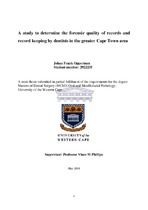| dc.contributor.advisor | Phillips, Vincent | |
| dc.contributor.author | Opperman, Johan Frank | |
| dc.date.accessioned | 2018-09-18T09:15:31Z | |
| dc.date.available | 2018-12-31T22:10:06Z | |
| dc.date.issued | 2018 | |
| dc.identifier.uri | http://hdl.handle.net/11394/6405 | |
| dc.description | Magister Chirurgiae Dentium - MChD (Maxillo-Facial & Oral Surgery) | |
| dc.description.abstract | South African dentists have a legal and ethical obligation to maintain complete and
comprehensive dental records. In addition to the legal and ethical requirements, dental records
are also important in the case of medico-legal issues, quality assurance processes and forensic
purposes. Valuable forensic evidence contained in dental records are used in the identification
of victims of mass disasters, personal victim identification e.g. in severely decomposed or
skeletonized remains where DNA or other biometric data are not available. The victim
identification process is highly dependent on complete, legible and accurate dental records. A
review of the literature however shows that dental record keeping practices are sub-optimal
worldwide.
There is a paucity of studies in South Africa regards to dental record keeping practices. The
aim of this study was to assess the record keeping practices of a sample of private practicing
dentists in Cape Town and surrounding towns, for forensic dental purposes. Knowledge and
awareness regards to forensic odontology as well as adherence to the guidelines prescribed by
the Health Professional Council of South Africa were also assessed. This was a cross-sectional
descriptive study, employing a researcher-administered questionnaire and a dental checklist for
forensic valuable items in the dental file. The results were entered in a MS Excel spreadsheet
and statistically analysed using IMB SPSS Statistics.
This study concluded that most of the dental records kept by Cape Town dentists are near to
optimal and would be helpful during forensic odontology investigations. However,
shortcomings in record keeping practices exists which may compromise the forensic accuracy
of their dental records. The study also shows a significant difference in dental record keeping
practices by dentists practicing in lower income areas in Cape Town, compared to those
practicing in economic affluent areas. The dentists in this study adhered to most of the
guidelines prescribed by the Health Professional Council of South Africa however, important
medico-legal information was missing from most dental records. This study hopes to contribute
to future comprehensive studies in the broader South Africa to determine the validity of dental
records for forensic odontology purposes. | |
| dc.language.iso | en | |
| dc.publisher | University of the Western Cape | |
| dc.subject | Dental Records, Adequacy, Quality, Forensic Odontology, Victim Identification, Knowledge and Awareness, Forensic Exposure, Guidelines, Medico-Legal, Record Maintenance | |
| dc.title | A study to determine the forensic quality of records and
record keeping by dentists in the greater Cape Town area | |
| dc.rights.holder | University of the Western Cape | |

